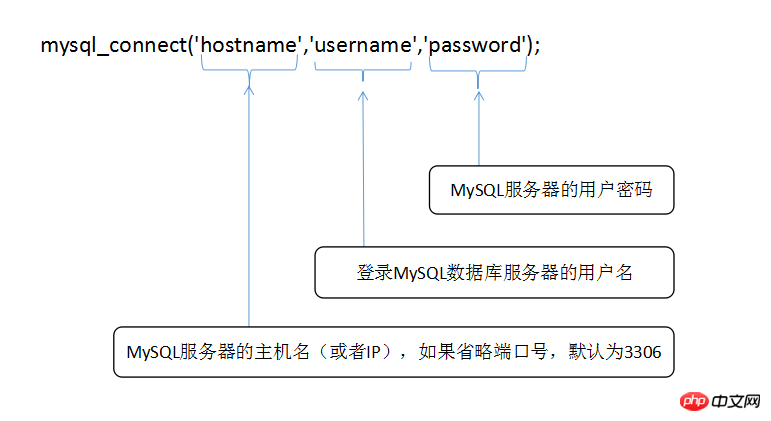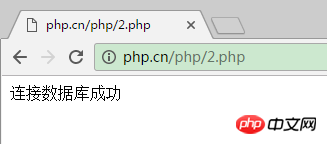 Database
Database
 Mysql Tutorial
Mysql Tutorial
 Use the mysql_connect() function to connect to the database (PHP method 1 for operating MySQL database)
Use the mysql_connect() function to connect to the database (PHP method 1 for operating MySQL database)
Use the mysql_connect() function to connect to the database (PHP method 1 for operating MySQL database)
Apr 20, 2017 pm 01:49 PMHow to operate MySQL database with PHP - use the mysql_connect() function to connect to mysql
##PHP provides a large number of MySQL database functions to facilitate the operation of the MySQL database Operation makes the development of web programs simpler and more flexible. In the previous article "Detailed explanation of the five steps of PHP accessing the MYSQL database (picture)", the steps for PHP to access the database were introduced. In this article we will introduce PHP to operate the database. Methods!
Use the mysql_connect() function to connect to mysql
To operate the MySQL database, you must first establish a connection with the MySQL server. The syntax format for connecting to the MySQL server As follows:mysql_connect('hostname','username','password');

<?php
header("Content-Type:text/html; charset=utf-8");
$link = mysql_connect("localhost","root","root")or die("不能連接到數(shù)據(jù)庫服務(wù)器!".mysql_error()); //連接MySQL 服務(wù)器
if($link){
echo "連接數(shù)據(jù)庫成功";
}
?>The output result is:

Note:
If you close the MySQL server, a prompt message will be output:
Can't connect to MySQL server on "localhost"(10061)
In the above code, use the mysql_connect() function to connect to the MySQL database server. As you can see from this function, you can Specify a non-local machine name as the database server, which ensures the off-site storage of data and the security isolation of the database. External user Wangwang has direct access rights to the WWW server. If the database system is placed directly on the WWW server, it will bring security risks to the MySQL database. If a firewall is installed for the database system, then PHP can access the database through the LAN, and the computers inside the LAN are invisible to the outside. This ensures that the database is not attacked by outsiders. In order to facilitate querying errors that occur due to connection problems, it is best to add an error shielding mechanism performed by the die() function. The above example uses the mysql_error() function to extract the error text of the MySQL function. If there is no error , an empty string is returned. If the browser displays the words "Warning: mysql_connect()...", it means that the database connection is wrong, so that the error location can be quickly discovered and corrected in time.Tips:
#In website development, errors are inevitable. Developers should try their best to avoid errors and make them in a timely manner. It is also necessary to accurately find the cause of the error, which requires constant accumulation of experience!
Mysql_connect() function connects to the database. We will introduce it here. Below we will introduce how to select a database file. For details, please read "PUsing the mysql_select_db() function to select a database file (PHP Method 2 of operating MySQL database)》!
The above is the detailed content of Use the mysql_connect() function to connect to the database (PHP method 1 for operating MySQL database). For more information, please follow other related articles on the PHP Chinese website!

Hot AI Tools

Undress AI Tool
Undress images for free

Undresser.AI Undress
AI-powered app for creating realistic nude photos

AI Clothes Remover
Online AI tool for removing clothes from photos.

Clothoff.io
AI clothes remover

Video Face Swap
Swap faces in any video effortlessly with our completely free AI face swap tool!

Hot Article

Hot Tools

Notepad++7.3.1
Easy-to-use and free code editor

SublimeText3 Chinese version
Chinese version, very easy to use

Zend Studio 13.0.1
Powerful PHP integrated development environment

Dreamweaver CS6
Visual web development tools

SublimeText3 Mac version
God-level code editing software (SublimeText3)

Hot Topics
 Why We Comment: A PHP Guide
Jul 15, 2025 am 02:48 AM
Why We Comment: A PHP Guide
Jul 15, 2025 am 02:48 AM
PHPhasthreecommentstyles://,#forsingle-lineand/.../formulti-line.Usecommentstoexplainwhycodeexists,notwhatitdoes.MarkTODO/FIXMEitemsanddisablecodetemporarilyduringdebugging.Avoidover-commentingsimplelogic.Writeconcise,grammaticallycorrectcommentsandu
 How to Install PHP on Windows
Jul 15, 2025 am 02:46 AM
How to Install PHP on Windows
Jul 15, 2025 am 02:46 AM
The key steps to install PHP on Windows include: 1. Download the appropriate PHP version and decompress it. It is recommended to use ThreadSafe version with Apache or NonThreadSafe version with Nginx; 2. Configure the php.ini file and rename php.ini-development or php.ini-production to php.ini; 3. Add the PHP path to the system environment variable Path for command line use; 4. Test whether PHP is installed successfully, execute php-v through the command line and run the built-in server to test the parsing capabilities; 5. If you use Apache, you need to configure P in httpd.conf
 PHP Syntax: The Basics
Jul 15, 2025 am 02:46 AM
PHP Syntax: The Basics
Jul 15, 2025 am 02:46 AM
The basic syntax of PHP includes four key points: 1. The PHP tag must be ended, and the use of complete tags is recommended; 2. Echo and print are commonly used for output content, among which echo supports multiple parameters and is more efficient; 3. The annotation methods include //, # and //, to improve code readability; 4. Each statement must end with a semicolon, and spaces and line breaks do not affect execution but affect readability. Mastering these basic rules can help write clear and stable PHP code.
 python if else example
Jul 15, 2025 am 02:55 AM
python if else example
Jul 15, 2025 am 02:55 AM
The key to writing Python's ifelse statements is to understand the logical structure and details. 1. The infrastructure is to execute a piece of code if conditions are established, otherwise the else part is executed, else is optional; 2. Multi-condition judgment is implemented with elif, and it is executed sequentially and stopped once it is met; 3. Nested if is used for further subdivision judgment, it is recommended not to exceed two layers; 4. A ternary expression can be used to replace simple ifelse in a simple scenario. Only by paying attention to indentation, conditional order and logical integrity can we write clear and stable judgment codes.
 PHP 8 Installation Guide
Jul 16, 2025 am 03:41 AM
PHP 8 Installation Guide
Jul 16, 2025 am 03:41 AM
The steps to install PHP8 on Ubuntu are: 1. Update the software package list; 2. Install PHP8 and basic components; 3. Check the version to confirm that the installation is successful; 4. Install additional modules as needed. Windows users can download and decompress the ZIP package, then modify the configuration file, enable extensions, and add the path to environment variables. macOS users recommend using Homebrew to install, and perform steps such as adding tap, installing PHP8, setting the default version and verifying the version. Although the installation methods are different under different systems, the process is clear, so you can choose the right method according to the purpose.
 What is PHP and What is it Used For?
Jul 16, 2025 am 03:45 AM
What is PHP and What is it Used For?
Jul 16, 2025 am 03:45 AM
PHPisaserver-sidescriptinglanguageusedforwebdevelopment,especiallyfordynamicwebsitesandCMSplatformslikeWordPress.Itrunsontheserver,processesdata,interactswithdatabases,andsendsHTMLtobrowsers.Commonusesincludeuserauthentication,e-commerceplatforms,for
 Your First PHP Script: A Practical Introduction
Jul 16, 2025 am 03:42 AM
Your First PHP Script: A Practical Introduction
Jul 16, 2025 am 03:42 AM
How to start writing your first PHP script? First, set up the local development environment, install XAMPP/MAMP/LAMP, and use a text editor to understand the server's running principle. Secondly, create a file called hello.php, enter the basic code and run the test. Third, learn to use PHP and HTML to achieve dynamic content output. Finally, pay attention to common errors such as missing semicolons, citation issues, and file extension errors, and enable error reports for debugging.
 How Do You Handle File Operations (Reading/Writing) in PHP?
Jul 16, 2025 am 03:48 AM
How Do You Handle File Operations (Reading/Writing) in PHP?
Jul 16, 2025 am 03:48 AM
TohandlefileoperationsinPHP,useappropriatefunctionsandmodes.1.Toreadafile,usefile_get_contents()forsmallfilesorfgets()inaloopforline-by-lineprocessing.2.Towritetoafile,usefile_put_contents()forsimplewritesorappendingwiththeFILE_APPENDflag,orfwrite()w





